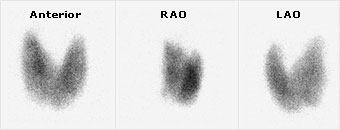What is a thyroid scan?
A thyroid scan (thyroid scintigraphy) is a diagnostic nuclear medicine test that provides information about the structure and function of the thyroid. The nuclear medicine physician is able to see the size, shape, function, and position of the thyroid gland.
Your child will swallow a capsule or liquid containing a radiopharmaceutical called Iodine-123. Iodine-123 has a tiny amount of radioactive molecules in it.
A special camera, called a gamma camera, is used to take pictures of the thyroid at four and 24 hours after the radiopharmaceutical has been ingested.
When might a thyroid scan be needed?
A thyroid scan can help assess:
- neck masses
- hypothyroidism
- hyperthyroidism
- ectopic thyroid
- thyroid malignancy
- thyroglossal duct cyst
- benign diffuse goiter
- thyroiditis
- radiation therapy planning
How should I prepare my child for a thyroid scan?
- Your child cannot have anything to eat or drink one hour prior to administration of the radiopharmaceutical and for 30 minutes afterward.
- The referring physician may ask that your child stop certain medications prior to having a thyroid scan.
- It is helpful to give your child a simple explanation as to why a thyroid scan is needed and assure her that you will be there for the entire time.
- You may want to bring your child's favorite book, toy, or comforting object to use while you wait.
Typically, imaging takes place at four and 24 hours after radiopharmaceutical administration, so please plan accordingly.
What should I expect when I bring my child to the hospital for a thyroid scan?
When you arrive, please go to the Nuclear Medicine check-in desk on the second floor of the main hospital. A clinical intake coordinator will check in your child and verify her registration information.
What happens during a thyroid scan?
Ingestion of the radiopharmaceutical
- You will be greeted by one of our nuclear medicine technologists who will explain to you and your child what will happen during the study.
- Your child will be asked to swallow a capsule or liquid containing the radiopharmaceutical.
Waiting period
- Once the administration of the radiopharmaceutical is complete, you are free to leave the department.
- The technologist will give you and your child an exact time to return for the actual imaging.
- Typically, imaging takes place at four and 24 hours after radiopharmaceutical administration.
The thyroid scan
- When you return, your child will be asked to void (use the bathroom) and imaging will begin.
- The camera comes very close to your child's neck.
- Three images of the thyroid gland are taken, each approximately 12 to 20 minutes in length.
- It is important that your child remain as still as possible during imaging to obtain the best quality images.

An image from a thyroid scan.
Will my child feel anything during a thyroid scan?
Although the camera may appear large and intimidating, it does not touch your child.
Is a thyroid scan safe?
We are committed to ensuring that your child receives the smallest radiation dose needed to obtain the desired result.
- Nuclear medicine has been used on babies and children for more than 40 years with no known adverse effects from the low doses employed.
- The radiopharmaceutical contains a very tiny amount of radioactive molecules. We believe that the benefit to your child's health outweighs potential radiation risk.
- The camera used to obtain the images does not produce any radiation.
- It is safe for you to be in the room with your child if you are pregnant or nursing
What happens after the thyroid scan?
Once the scan is complete, the images will be evaluated for quality. If the scan is adequate, your child will be free to leave and resume normal activity. One of the Boston Children's nuclear medicine physicians will review your child's images and create a report of the findings and diagnosis.
How do I learn the results of the thyroid scan?
The nuclear medicine physician will provide a report to the doctor who ordered your child's thyroid scan. Your child's doctor will then discuss the results with you.
How Boston Children's Hospital approaches thyroid scans
Our Nuclear Medicine and Molecular Imaging Program is committed to providing a safe, comfortable and child-friendly atmosphere with:
- specialized nuclear medicine physicians with expertise in interpreting thyroid scans in children of all ages
- certified nuclear medicine technologists with years of experience imaging children and teens
- equipment adapted for pediatric use, which means age-appropriate care for children
- protocols that keep radiation exposure as low as reasonably achievable while assuring high image quality
Thyroid Scan | Programs & Services
Programs
Thyroid Center
Program
The Thyroid Center offers clinical evaluation and treatment for infants, children, and adolescents with all types of thyroid disease.
Departments
Radiology
Department
The Department of Radiology provides a full range of imaging services for newborns, infants, children, teenagers, young adults, and pregnant women.

